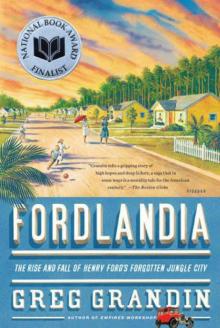Fordlandia: The Rise and Fall of Henry Ford's Forgotten Jungle City 

by Greg Grandin
Genre: Other6
Published: 2010
View: 2047
Read OnlineRead Fordlandia: The Rise and Fall of Henry Ford's Forgotten Jungle City Storyline:
The stunning, never before told story of the quixotic attempt to recreate small-town America in the heart of the AmazonIn 1927, Henry Ford, the richest man in the world, bought a tract of land twice the size of Delaware in the Brazilian Amazon. His intention was to grow rubber, but the project rapidly evolved into a more ambitious bid to export America itself, along with its golf courses, ice-cream shops, bandstands, indoor plumbing, and Model Ts rolling down broad streets. Fordlandia, as the settlement was called, quickly became the site of an epic clash. On one side was the car magnate, lean, austere, the man who reduced industrial production to its simplest motions; on the other, the Amazon, lush, extravagant, the most complex ecological system on the planet. Ford’s early success in imposing time clocks and square dances on the jungle soon collapsed, as indigenous workers, rejecting his midwestern Puritanism, turned the place into a ribald tropical boomtown. Fordlandia’s eventual demise as a rubber plantation foreshadowed the practices that today are laying waste to the rain forest. More than a parable of one man’s arrogant attempt to force his will on the natural world, Fordlandia depicts a desperate quest to salvage the bygone America that the Ford factory system did much to dispatch. As Greg Grandin shows in this gripping and mordantly observed history, Ford’s great delusion was not that the Amazon could be tamed but that the forces of capitalism, once released, might yet be contained. Fordlandia is a 2009 National Book Award Finalist for Nonfiction.Amazon.com ReviewAmazon Best of the Month, June 2009: Proving that truth can indeed be stranger than fiction, Fordlandia is the story of Henry Ford's ill-advised attempt to transform raw Brazilian rainforest into homespun slices of Americana. With sales of his Model-T booming, the automotive tycoon saw an opportunity to expand his reach further by exploiting a downtrodden Brazilian rubber industry. His vision, the laughably-named Amazonian outpost of Fordlandia, would become an enviable symbol of efficiency and mark the Ford Motor Company as a player on the global stage. Or so he thought. With thoughtful and meticulous research, author Greg Grandin explores the astounding oversights (no botanists were consulted to confirm the colony's agricultural viability) and painful arrogance (little thought was paid to how native Brazilians would react to an American way of life) that hamstrung the project from the start. Instead of ushering in a new era of commerce, Fordlandia became a cautionary tale of a dream destroyed by hubris. --Dave Callanan Take a Closer Look at Images from Fordlandia: The Rise and Fall of Henry Ford's Forgotten Jungle City(Click on images to enlarge) A sketch of the opera house in Manus,Brazil (aka. "the tropical Paris")An Amazonian familyemployed in the rubber tradeFord executives on the deck of The Ormoc enroute to the AmazonWorkers clearing the rainforestbefore construction can beginMundurucú mission childrenwith German nunsA Lincoln Zephyr stuckin Fordlandia mudFordlandia's Riverside Avenuenear the Tapajós RiverRuins of Fordlandia's powerhouseRuins of the sawmillat Iron MountainFrom Publishers WeeklyStarred Review. Gandin, an NYU professor of Latin American history, offers the thoroughly remarkable story of Henry Ford's attempt, from the 1920s through 1945, to transform part of Brazil's Amazon River basin into a rubber plantation and eponymous American-style company town: Fordlandia. Gandin has found a fascinating vehicle to illuminate the many contradictory parts of Henry Ford: the pacifist, the internationalist, the virulent anti-Semite, the $5-a-day friend of the workingman, the anti-union crusader, the man who ushered America into the industrial age yet rejected the social changes that followed urbanization. Both infuriating and fascinating, Ford is only a piece of the Fordlandia story. The follies of colonialism and the testing of the belief that the Amazon—where 7,882 organisms could be found on any given five square miles—could be made to produce rubber with the reliability of an auto assembly line makes a surprisingly dramatic tale. Although readers know that Fordlandia will return to the jungle, the unfolding of this unprecedented experiment is compelling. Grandin concludes that Fordlandia represents in crystalline form the utopianism that powered Fordism—and by extension Americanism. Readers may find it a cautionary tale for the 21st century. 54 b&w photos. (June) Copyright © Reed Business Information, a division of Reed Elsevier Inc. All rights reserved.Pages of Fordlandia: The Rise and Fall of Henry Ford's Forgotten Jungle City :